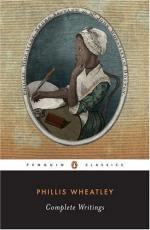|
This section contains 3,916 words (approx. 14 pages at 300 words per page) |

|
SOURCE: "Subjection and Prophecy in Phillis Wheatley's Verse Paraphrases of Scripture," College Literature, No. 22-23, October, 1995, pp. 122-30.
In the following essay, Scheick examines scriptural references in Wheatley's poetry, and claims that she employs these elements in an "appropriated ministerial voice" in order to emphasize the immorality of slavery.
The critical response to the poetry of Phillis Wheatley (c. 1754-1784) often registers disappointment or surprise. Some critics have complained that this African-American slave's verse is insecure (Collins 78), imitative (Richmond, Bid the Vassal 54-66), and incapacitated (Burke 33, 38)—at its worst the "product of a White mind" (Jamison 414-15) and "the barter of [the poet's] soul" (Richmond, "On 'The Barter'" 127). Others, in contrast, have applauded Wheatley's critique of Anglo-American discourse (Kendrick 222-23), her acknowledgment of her African heritage, and her verification of selfhood (Baker 39-41). Some have observed critiques of slavery in her use of classical tradition and irony (Shields...
|
This section contains 3,916 words (approx. 14 pages at 300 words per page) |

|


